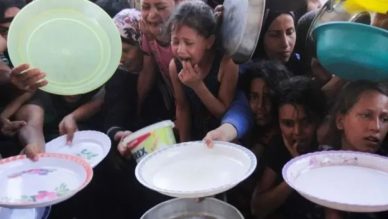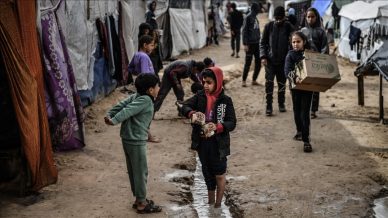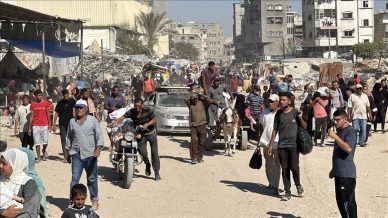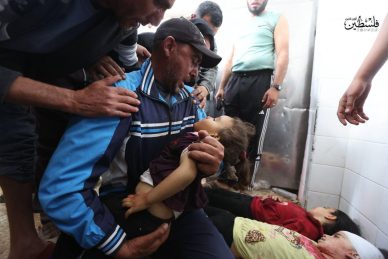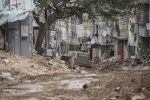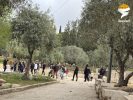GAZA, (PIC)
As the fuel and cooking gas crisis in northern Gaza persists, thousands of Palestinians face worsening daily struggles without necessary alternatives. Many families resort to cooking food using firewood, paper, and cardboard—an exhausting and hazardous solution that exposes them to severe health and environmental risks.
Since the genocidal war in Gaza began over 14 months ago, Israel has strictly and completely banned the entry of cooking gas into the northern areas of the Gaza Strip, which continue to endure a brutal campaign of genocide and ethnic cleansing.
Residents who refused to flee their homes in northern Gaza, despite relentless bombing and the occupier’s cruelty, began searching for substitutes for cooking gas, turning to burning wood, paper, and whatever else they could find.
What can we burn?
Ahmed Daloul told the PIC reporter: “No cooking gas has entered here at all. We’ve been forced to use wood, paper, and anything that can burn, but even that is no longer available.”
He questioned with despair: “What do we burn? How do we cook? We’ve burned doors, bedroom furniture, plastic, and trees. We’re in a real crisis.”
Ahmed emphasized that they are now desperately searching for alternatives to their previous alternatives, but everyone is left helpless. In his words: “There’s simply nothing left to burn.”
A tool of punishment
Since the start of the genocide, Israel has weaponized cooking gas as a tool to punish civilians. It completely bans gas entry into northern Gaza and restricts its availability in central and southern areas, leaving all residents caught in a cycle of uncertainty and despair.
Sabreen Afaneh, who is displaced at a school west of Gaza City, told our reporter that she and her children search every morning for pieces of plastic, nylon, and anything flammable to cook what little food they have.
Sabreen admits she is fully aware of the dangers of using waste to prepare food but adds with resignation: “We have no choice. What do we burn? How do we cook for the children?”
She continued: “Many times, we’re forced to eat food without heating it, and we’ve drastically cut down on using fire at all because of this suffocating crisis and the absence of alternatives.”
Respiratory diseases on the rise
Reports from Gaza’s Government Media Office indicate hundreds of respiratory disease cases in the enclave’s hospitals due to the toxic fumes emitted from burning fires for cooking amid the worsening gas crisis.
Every day, Sabreen takes over the task for her injured husband, searching the streets of the destroyed city for anything to burn while under the constant noise of aircraft and explosions. “I feel fear and terror daily, but I have no choice. We have nothing to burn to prepare food,” she explained.
Sabreen appealed to the world to intervene to stop the genocide and hold the occupiers accountable for their crimes, criticizing the global inaction and complicity in Israel’s ongoing atrocities.
“The smoke from these fires suffocates me every day as I cook. I fear developing respiratory diseases—or perhaps I already have,” she added.
Burning waste
Hassan Abu Zayed, a resident of Sheikh Radwan, said there’s nothing left to burn in his area—not wood, not paper, nor nylon. “Some people have been forced to burn waste, fully knowing how dangerous it is to their health and the health of their children,” he told our reporter.
He described the situation with sorrow: “Can you imagine? Cooking gas hasn’t entered northern Gaza at all. People here have burned everything they can. What more can they do to us? They’ve killed us, starved us, made us thirsty, and humiliated us.”
Yet, with determination, he concluded: “They will never break us or defeat us.”
Ali Abu Al-Araj spoke with anguish and anger: “We’ve burned everything—our furniture, nylon, and cardboard. Our homes are gone. We can’t find anything to burn to prepare meals.”
He revealed that his wife now suffers from chest and lung problems due to the smoke from the fires, and they cannot find doctors to treat her amidst the collapse of Gaza’s healthcare system.
Ali wished for a solution to end the genocide that has affected every aspect of life in Gaza, causing immense suffering for all its residents.
Forced to close a bakery
A young man named Oday had to shut down two businesses he launched to support his family during this unprecedented war due to the lack of gas and firewood.
Oday initially opened a wood-fired bakery to provide bread for residents during the crisis but was later forced to close it. His other business selling falafel also shut down for the same reasons—no gas and no wood.
He explained that most people cannot afford firewood, as its price has soared to over $3 per kilogram, exacerbating the catastrophic economic conditions, especially in northern Gaza.
Oday expressed hope for an end to residents’ suffering, urging pressure on the occupiers to allow gas and firewood into northern Gaza.


